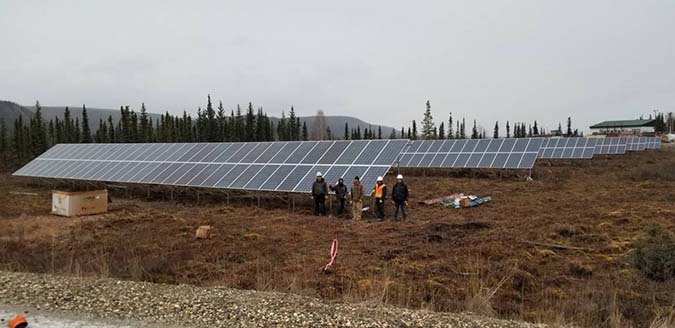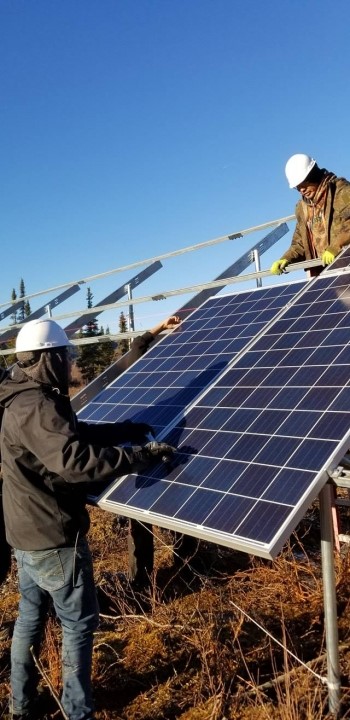
The Hughes solar-diesel microgrid has 120 kilowatt hour (kwh) or lithium-ion battery storage. The battery that will be installed by September 2020 possesses 250 kW worth of output and 337 kwh total capacity.
Source: Credit to Tanana Chiefs Conference (TCC)
| Location | Hughes, Alaska |
|---|---|
| Project Sponsor / Borrower | Hughes Village/Tanana Chiefs Conference (TCC) |
| Program Areas |
|
| Value Capture Techniques | Right-of-Way Use Agreements; Special Assessment |
| Mode | Other: Solar Power |
| Description | Due to its location 210 air miles northwest of Fairbanks, the Native Village of Hughes, Alaska relied heavily on diesel fuel delivered via air and boat for all of its non-harvested commodities. To eliminate this dependence on imported fossil fuels, Hughes created the Sustainable Solar Energy for Hughes Village project. Hughes set a goal to reduce its fuel use by 50 percent over 2010 levels by 2025. The project also included a replicable photovoltaic (PV)-diesel hybrid electric system to be deployed in Alaska Native villages across the State. The system was designed to:
In 2019, Hughes finished installing the 120-kilowatt (kW) solar PV array in conjunction with a lithium ion battery bank. The system supplies electricity to the local village electric grid and also offers electricity for the 50 buildings with electric meters in Hughes. It is the largest solar PV array installed in a rural Alaskan community to-date, and it allows the community to run solely on solar power during the summer when solar production peaks. |
| Cost | $1.12 million |
| Funding Sources |
|
| Project Delivery / Contract Method | Design-build |
| Private Partner | N/A |
| Project Advisors / Consultants |
|
| Lenders | DOE |
| Duration / Status | The project's conception was in August 2016 with construction of the solar array complete in June 2019. The project's projected lifespan is 20 years. |
| Financial Status / Financial Performance | In September 2016, the DOE Office of Indian Energy provided $623,900 in grant funding for the Hughes Village Council's "Sustainable Solar Energy for Hughes Village" project. The DOE grant supplements the Council's contribution of $500,000 for the project, which aims to cut the Village's annual diesel use by 25 percent. |
| Innovations |
|
| Related Links / Articles | Energy.gov – Can Solar Work in Alaska? Energy.gov – Hughes Village Council – 2016 Project |
| Contacts | Dave Messier |
